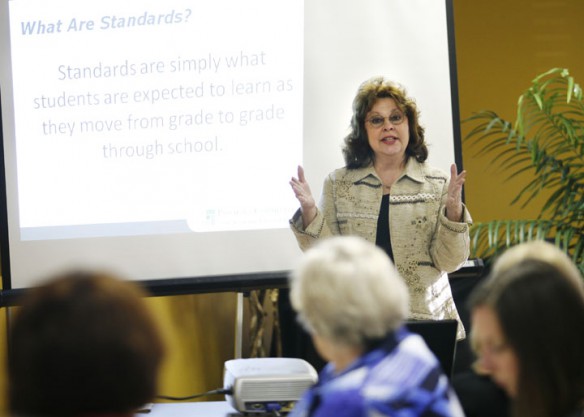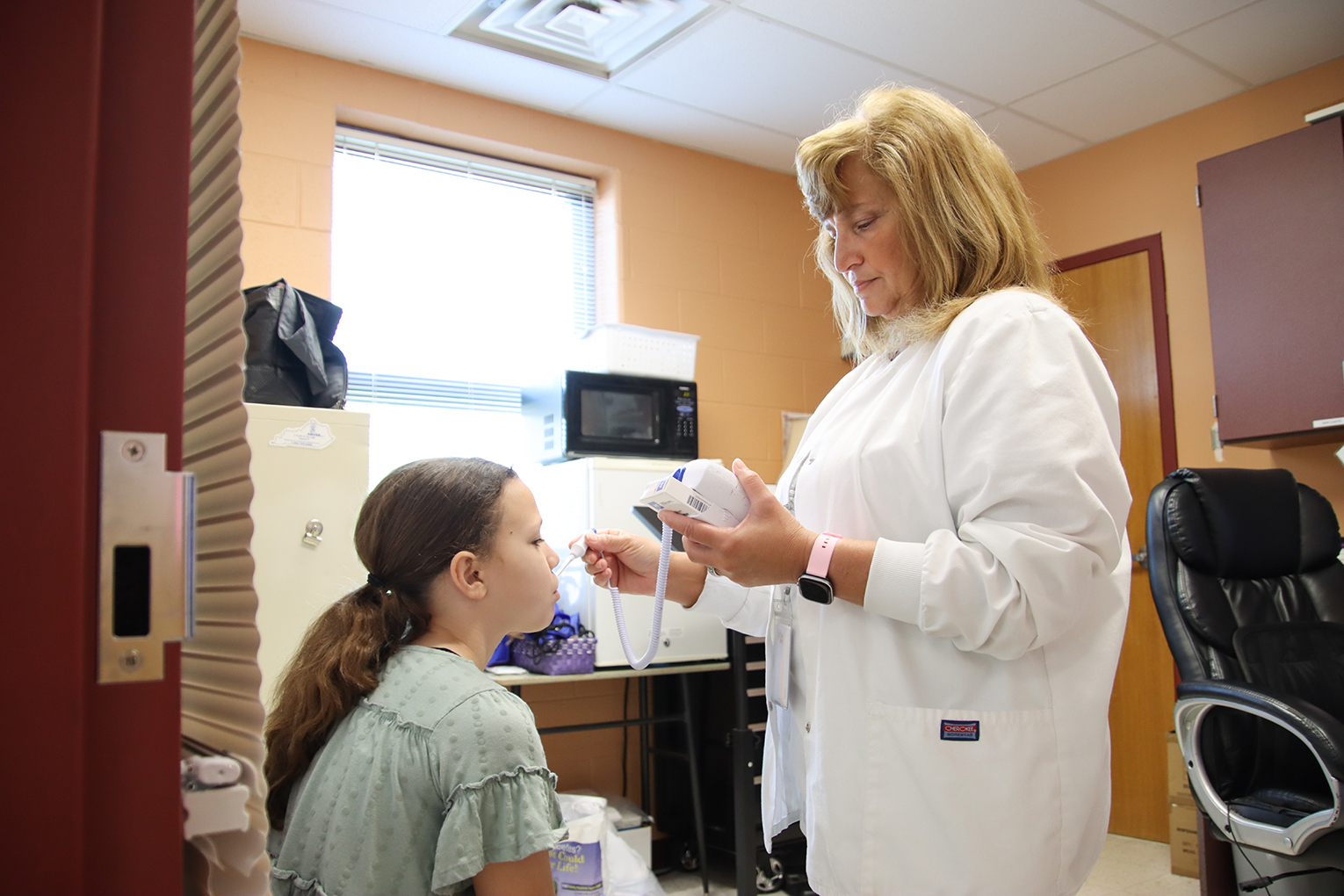
Robyn Oatley, project manager for ReadyKentucky, speaks about Kentucky’s Common Core State Standards at the League of Women Voters meeting in Louisville. Photo by Amy Wallot, Aug. 30, 2011
By Susan Riddell
Kentucky teachers are working hard on implementing the new Common Core State Standards (CCSS) in English/language arts and mathematics this school year to better prepare students for college and/or career.
And it’s critical that teachers partner with parents in the process, stakeholders say.
Kentucky Department of Education (KDE) Associate Commissioner Felicia Cumings Smith said that partnership begins with teachers educating parents.
“Parents need to know that there has been a change in standards, and the expectations are changing,” Cumings Smith said. “Students are going to be expected to encounter more intellectually or cognitively challenging work.
“In many cases, grade-level expectations are not the same as they have been in the past,” Cumings Smith added. “That is going to be critical for teachers to communicate to parents. If they have a 3rd-grade child, for example, the expectations for a 3rd grader are different from a year ago in many instances.”
Karen Kidwell, director of the Division of Program Standards in the Office of Next-Generation Learners at KDE, added that with the new standards, students will be applying their learning to real-world problems and challenges.
“Students will get to experience more deep-thinking and problem-solving situations that don’t necessarily have a single solution or way to approach them,” Kidwell said. “As the standards are implemented, parents will notice that difference in student homework.”
What do parents already know?
ReadyKentucky, a project organized by the Prichard Committee for Academic Excellence with support from the Bill and Melinda Gates Foundation, is focused on making sure teachers and parents receive accurate and timely information about the new Common Core State Standards, adopted here as the Kentucky Core Academic Standards, and other public education initiatives.
Robyn Oatley, project manager for ReadyKentucky, said it is essential for parents to have a good grasp on the new standards and how they will impact student college- and career-readiness.
“This will help our graduates compete for jobs in the global workplace,” Oatley said. “We have parent-friendly information right now; the national PTA has some colorful, parent-friendly documents for English/language arts and mathematics common core.”
Last spring, the Kentucky PTA hosted four Parent PEP (Partnering to Empower Parents) Rallies across the state. Parents who attended had the option to sit in on breakout sessions regarding the new standards. These parents also received information regarding classroom and statewide assessment; information on the new accountability model including school and district classifications; and details on KDE’s Unbridled Learning: College and Career Readiness initiative, among other things.
Kidwell said the Council of Chief State School Officers also is producing a communications packet that has tools created for teachers and parents.
“We would also encourage teachers and parents to work through interactive online Senate Bill 1 modules that KDE has provided,” Cumings Smith added. “We need more parents to engage in them because there is a module that helps parents understand what these new standards are.”
Forming the parent/teacher partnership
Schools are communicating with parents using newsletters, superintendent or principal blogs or district websites. Many teachers are following suit, Cumings Smith said.
“Many districts have websites where teachers post information on a regular basis, and I think that can be a space for teachers to really engage parents and make sure they are up to speed on what’s happening in their classrooms around the new standards implementation in addition to what goes home in the evening,” she said. “Just be clear about the expectations of learning.”
Oatley agreed but added that websites must be kept current, and it’s important to stick with a language that won’t frustrate or confuse parents.
“We can’t use our acronyms and pedagogy and expect them to embrace us with trust,” Oatley said. “They need to know in the plainest language what their child is expected to know, whether they know it and how schools and parents can partner to maximize a child’s progress.
“Teachers need to listen more and talk less as parents come in for conferences and truly ‘seek to understand’ the concerns of parents and/or students,” Oatley added. “Educators should anticipate what questions may be on parents’ minds and have some simple explanations drafted ahead of time or short, clear handouts to support them after they get home.”
Communicating with parents is a priority this year, Cumings Smith said.
“Teachers are going to have to ramp up their communications with parents and not just rely on parents to seek out the new information,” she said.
“Teachers need to communicate with parents about the learning expectations each month the kids are in school,” Kidwell added. “To me, as a former primary teacher, that’s the way you get parent support; you keep them informed. You say, ‘This week, we’re going to be working on this,’ or ‘Here are the targets in my classroom.’”
Be honest and forthcoming with parents, Kidwell and Cumings Smith said. If parents want specifics regarding the standards, teachers should make sure parents leave with a good understanding of what to expect during the school year. This, in many instances, is not new practice but with new standards should be the common practice across the state.
“National PTA has grade-by-grade parent guides on the new standards that they can access online,” Kidwell said. “All of our specialists have previewed those to make sure that they concur with the way the information was presented, and providing that link to parents would be significant.”
“We should encourage conversations about the new standards, how they are going to be implemented over the course of the year and what the expectations are for each child,” Cumings Smith added. “This should happen at the first parent-teacher conference. These parents will need to be asking critical questions about where their child may be on learning continuum.”
With teacher assistance and assurance, parents will see how the new standards will have a positive, long-term impact on student achievement.
“As educators, we need to be clear with parents because we anticipate the state assessment scores will go down at first, and it will be important for teachers to communicate with parents to help them understand why there is a shift in student achievement as a result of new standards,” Cumings Smith said. “Teachers have to ensure parents that continuous learning is occurring.”
“To me, that’s the bottom line,” Kidwell added. “If a parent knows the expectation, when the teacher has a conference with the parent and says the child has been struggling, parents will be more receptive to that. They won’t be saying, ‘How was I supposed to know that? You never told me how I might have been able to help.’”
It’s also important for teachers to remember that a parent/teacher partnership is something that shouldn’t be viewed as a new thing.
“For 20 years with the Kentucky Education Reform Act and even with our new legislation – Senate Bill 1 – and Unbridled Learning, there’s always been an expectation that parents will be partners in the educational experience,” Cumings Smith said. “There will continue to be that expectation, now more than ever because we have new standards and a new accountability system.”
MORE INFO …
Felicia Cumings Smith, felicia.smith@education.ky.gov, 502-564-9850, ext.4151
Karen Kidwell, karen.kidwell@education.ky.gov, (502) 564-2106
Robyn Oatley, robyn.oatley@gmail.com, (859) 608-9328




Here is the ultimate resource for parents:
http://www.pta.org/4446.htm
The most up to date information for parents.
Also contact your local PTA for up to date information on how your school is implementing CCSS.